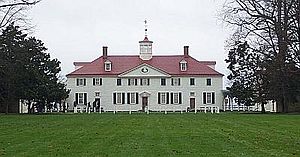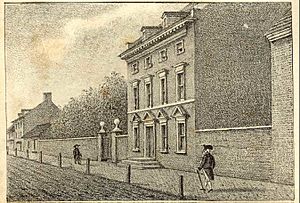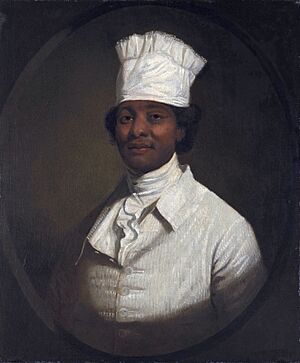Hercules Posey facts for kids
Quick facts for kids
Hercules Posey
|
|
|---|---|
| Born | 1748 |
| Died | May 15, 1812 |
| Nationality | American |
| Other names | Uncle Harkless |
| Occupation | Cook to George Washington |
| Known for | Cook Fugitive slave |
| Children | 3 (maybe 4) |
Hercules Posey (born 1748 – died May 15, 1812) was an enslaved African man. He was owned by George Washington at his plantation Mount Vernon in Virginia. People called him "Uncle Harkless." He was the main cook at the Mansion House for many years. In November 1790, Hercules was one of eight enslaved people brought by President Washington to Philadelphia, Pennsylvania. This city was the temporary national capital at the time. He worked in the household of the third presidential mansion.
On February 22, 1797, which was Washington's 65th birthday, Hercules escaped from Mount Vernon. He fled to New York City. There, he lived under the name "Hercules Posey." Posey remained a fugitive, meaning he was still legally enslaved, until January 1, 1801. On this date, he was freed under the rules of Washington's will. Hercules's late wife, Alice, was a "Dower" slave. This meant she was owned by the estate of Martha Washington's first husband. Because of this, their three children were not freed. Hercules Posey died in New York City in 1812. He was buried in the Second African Burying Ground.
Contents
Life at Mount Vernon

Hercules was likely born around 1748. George Washington got him as payment for a loan. This loan was made to Hercules's first owner, John Posey. Hercules first appeared in tax records for Mount Vernon in 1771.
Hercules chose Alice as his wife. She was one of Martha Washington's "Dower" slaves. They had three children together: Richmond (born 1777), Eve (born 1782), and Delia (born 1785). Hercules, Alice, and their three children were listed in the February 1786 Mount Vernon Slave Census. This record shows him as one of two cooks in the Mansion House. Alice died in 1787.
After Alice's death, Hercules might have had another daughter. The only information about this daughter comes from Louis Philippe's diary. Louis Philippe's secretary guessed the girl was 6 years old. However, she might have been Hercules's daughter Eve. Eve was listed in the June 1799 Mount Vernon Slave Census as "a dwarf."
Working for the President

Hercules was one of nine enslaved people brought to Philadelphia in 1790. They came with Washington to work in the presidential household. The others were his son Richmond (who was 13), Oney Judge, Moll, Austin, Christopher Sheels, Giles, Paris, and Joe (Richardson).
G.W.P. Custis, Martha Washington's grandson, wrote about Hercules. He remembered Hercules as "a celebrated artiste." He said Hercules was a very skilled cook. The cook was allowed to sell extra food from the Philadelphia kitchen. Custis thought this earned Hercules almost $200 a year. This was about the same as a hired cook's yearly pay. According to Custis, Hercules dressed very well. He was also allowed to walk freely around the city.
Washington let Hercules's son Richmond work with his father in the Philadelphia kitchen for about a year. Then, Richmond returned to Virginia. In November 1796, Richmond was involved in a money theft at Mount Vernon. Washington suspected that Hercules and his son were planning to escape together.
Pennsylvania's Gradual Abolition Act
In 1780, Pennsylvania passed a law called the Gradual Abolition Act. This law said that all future children born to enslaved people in the state would be free. It also said that slaveholders from other states could not keep enslaved people in Pennsylvania for more than six months. If they stayed longer, those enslaved people could register as Pennsylvania residents and claim their freedom. Members of Congress and their enslaved people were not affected by this law.
When the national capital moved to Philadelphia in 1790, there was a question. Would this state law apply to federal officials like President Washington? Washington believed the law should not apply to him. He said he was a citizen of Virginia. He was only in Pennsylvania because it was the temporary capital. To avoid the law, Washington followed advice from his attorney general, Edmund Randolph. He regularly moved the enslaved people from the President's House out of the state and back. This prevented them from living in Pennsylvania for six months straight.
New Discoveries About Hercules
Research in 2010
Stephen Decatur Jr.'s book The Private Affairs of George Washington (1933) said that Hercules escaped from Philadelphia in March 1797. This was at the end of Washington's time as president. Decatur found old family papers. These papers suggested Hercules escaped from Philadelphia.
New research has changed this idea. Historian Anna Coxe Toogood found records showing Hercules was at Mount Vernon after Christmas 1796. The Washingtons had returned to Philadelphia. During that winter, Hercules and Richmond were listed in Mount Vernon farm records. They were assigned to do hard labor, like breaking stones and digging clay.
In November 2009, Mary V. Thompson, a researcher at Mount Vernon, made a discovery. She found that Hercules escaped from Mount Vernon, not Philadelphia. His escape happened on February 22, 1797. This was Washington's 65th birthday. The president celebrated in Philadelphia. But it was also a holiday on the Virginia plantation. A farm report from Mount Vernon that week noted that Hercules "absconded 4 [days ago]." This means he ran away four days earlier.
Research in 2019
In March 2019, Craig LaBan reported in The Philadelphia Inquirer about new findings. Ramin Ganeshram found new information about where Hercules went after his escape. Ganeshram and Sara Krasne at the Westport Historical Society found strong clues. They suggest Hercules, who had no records after 1801, lived and died in New York City. Krasne found a record listing a Hercules Posey from Virginia. He was 64 years old and died of consumption on May 15, 1812. He was buried in the Second African Burying Ground in New York City. Their new research was published in 2019.
Freedom for Some
Louis-Philippe, who later became king of France, visited Mount Vernon in the spring of 1797. In his diary entry from April 5, he wrote:
The general's cook ran away, being now in Philadelphia, and left a little daughter of six at Mount Vernon. Beaudoin ventured that the little girl must be deeply upset that she would never see her father again; she answered, "Oh! Sir, I am very glad, because he is free now."
Hercules stayed hidden. In January 1798, Frederick Kitt, Washington's former house steward, told Washington that Hercules was living in Philadelphia:
Since your departure I have been making distant enquiries about Herculas but did not till about four weeks ago hear anything of him and that was only that [he] was in town neither do I yet know where he is, and that it will be very difficult to find out in the secret manner necessary to be observed on the occasion.
The 1799 Mount Vernon Slave Census listed 124 enslaved people owned by Washington. It also listed 153 "dower" slaves owned by Martha Washington's family. Washington's 1799 Will said that his enslaved people should be freed after Martha's death. Washington died on December 14, 1799. Martha Washington asked for her late husband's enslaved people to be freed sooner. So, the three people in charge of Washington's Estate freed them on January 1, 1801. It is possible that Hercules did not know he had been freed. He was legally no longer a fugitive.
In a letter dated December 15, 1801, Martha Washington wrote that she had learned Hercules was living in New York City. He was legally free by then. We don't know much more about where he lived or what he did after gaining freedom.
Hercules's Children
Hercules and his wife Alice had three children: a son named Richmond (born 1777) and daughters Eve (born 1782) and Delia (born 1785). Alice was a "dower" slave. This meant she belonged to the Estate of Daniel Parke Custis, Martha Washington's first husband. Louis Philippe I, who later became the last King of France, visited Mount Vernon in 1797. He wrote in his diary about Hercules's escape and how he left behind his six-year-old daughter. This might have been Eve, or it could have been a fourth child Hercules had after his wife died.
A slave census taken in June 1799, just a few months before George Washington died, shows what happened to his children. Richmond, in his early twenties, was working at the River Farm, a part of Mount Vernon. Eve and Delia, in their teens, were working at the Mansion House.
Hercules and the other African Americans enslaved by George Washington were eventually freed in 1801. However, Hercules's children were not freed. Neither Martha Washington nor George Washington owned the "dower" slaves. Because Alice was a "dower" slave, her children had the same legal status. After Martha Washington died, the Daniel Parke Custis Estate was closed. Its assets, including enslaved people, were divided. Richmond, Eve, and Delia would have been divided among Martha Washington's four grandchildren. But we don't know where each child was sent.
Hercules's Legacy

A new building for the Liberty Bell opened in Philadelphia in 2003. During digging in 2000, parts of the icehouse from the old President's House were found. This house had been torn down a long time ago. More digging happened in 2007. This revealed the foundations of the kitchen, an underground passage to the main house, and the foundations of the Bow Window. A memorial has been built at the site of the President's House. It honors the house and everyone who lived there. It also recognizes the important contributions of the enslaved people in Philadelphia's and American history.
A portrait, once believed to be of Hercules and painted by Gilbert Stuart, is now in the Thyssen-Bornemisza Museum in Madrid, Spain. Experts looked at it in 2017. They found that it was not Hercules at all. Also, it was not painted by Stuart, but by a free Dominican man.
A picture book for young children about Hercules, A Birthday Cake for George Washington, was published in January 2016. It was illustrated by Vanessa Brantley-Newton and written by Ramin Ganeshram. The book received strong criticism for showing "happy slaves." Because of this, its publisher, Scholastic Trade Publishing, removed it from sale. In 2018, Ganeshram published The General's Cook. This was a novel she had been working on before the picture book. In the novel's acknowledgments, the author repeated her public statements. She had objected to and tried to change what she called the "offensive nature" of the picture book's illustrations.
|
 | Aurelia Browder |
 | Nannie Helen Burroughs |
 | Michelle Alexander |

